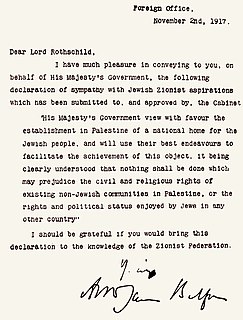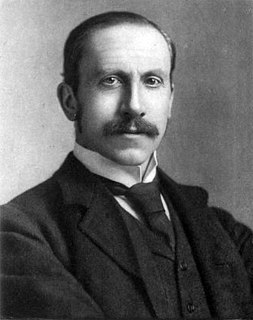
The Balfour Declaration was a public statement issued by the British government in 1917 during the First World War announcing its support for the establishment of a "national home for the Jewish people" in Palestine, then an Ottoman region with a small minority Jewish population. The declaration was contained in a letter dated 2 November 1917 from the United Kingdom's Foreign Secretary Arthur Balfour to Lord Rothschild, a leader of the British Jewish community, for transmission to the Zionist Federation of Great Britain and Ireland. The text of the declaration was published in the press on 9 November 1917.
Isolationism is a political philosophy advocating a national foreign policy that opposes involvement in the political affairs, and especially the wars, of other countries. Thus, isolationism fundamentally advocates neutrality and opposes entanglement in military alliances and mutual defense pacts. In its purest form, isolationism opposes all commitments to foreign countries including treaties and trade agreements. This distinguishes isolationism from non-interventionism, which also advocates military neutrality but does not necessarily oppose international commitments and treaties in general.

John Lewis Gaddis is an American international relations scholar, military historian, and writer. He is the Robert A. Lovett Professor of Military and Naval History at Yale University. He is best known for his work on the Cold War and grand strategy, and he has been hailed as the "Dean of Cold War Historians" by The New York Times. Gaddis is also the official biographer of the seminal 20th-century American statesman George F. Kennan. George F. Kennan: An American Life (2011), his biography of Kennan, won the 2012 Pulitzer Prize for Biography or Autobiography.

The New World Order (NWO) is a conspiracy theory which hypothesizes a secretly emerging totalitarian world government.

Alfred Milner, 1st Viscount Milner, was a British statesman and colonial administrator who played a role in the formulation of British foreign and domestic policy between the mid-1890s and early 1920s. From December 1916 to November 1918, he was one of the most important members of Prime Minister David Lloyd George's War Cabinet.

Foreign Policy is an American news publication, founded in 1970 and focused on global affairs, current events, and domestic and international policy. It produces content daily on its website and app, and in four print issues annually.
William Appleman Williams was one of the 20th century's most prominent revisionist historians of American diplomacy. He achieved the height of his influence while on the faculty of the department of history at the University of Wisconsin–Madison and is considered to be the foremost member of the "Wisconsin School" of diplomatic history.

Carroll Quigley was an American historian and theorist of the evolution of civilizations. He is remembered for his teaching work as a professor at Georgetown University, and for his writing about global conspiracies, in which he argued that an Anglo-American banking elite have worked together for centuries to spread certain values globally.

Orlando Guy Figes is a British historian and writer. Until his retirement, he was Professor of History at Birkbeck College, University of London.

The Zweites Buch, published in English as Hitler's Secret Book and later as Hitler's Second Book, is an unedited transcript of Adolf Hitler's thoughts on foreign policy written in 1928; it was written after Mein Kampf and was not published in his lifetime.

Howard Waring French is an American journalist, author, and photographer, as well as professor since 2008 at the Columbia University Graduate School of Journalism. Prior to re-entering academia, he was a longtime foreign correspondent and senior writer with The New York Times.
The Round Table movement, founded in 1909, was an association of organisations promoting closer union between Britain and its self-governing colonies.
Robert A. Dallek is an American historian specializing in the presidents of the United States, including Franklin D. Roosevelt, John F. Kennedy, Lyndon B. Johnson, and Richard Nixon. He retired as a history professor at Boston University in 2004 and previously taught at Columbia University, the University of California, Los Angeles (UCLA), and Oxford University. He won the Bancroft Prize for his 1979 book Franklin D. Roosevelt and American Foreign Policy, 1932–1945 as well as other awards for scholarship and teaching.

Ha-Joon Chang is a South Korean institutional economist, specialising in development economics. Chang is the author of several widely discussed policy books, most notably Kicking Away the Ladder: Development Strategy in Historical Perspective (2002). In 2013, Prospect magazine ranked Chang as one of the top 20 World Thinkers.
Rhodri Jeffreys-Jones is professor of American history emeritus and an honorary fellow in History at the University of Edinburgh, Scotland. He is an authority on American intelligence history, having written two American intelligence history surveys and studies of the CIA and FBI. He has also written books on women and American foreign policy, America and the Vietnam War, and American labor history.
Frank McDonough is a British historian of the Third Reich and international history.
Frederick Scott Oliver, or F.S. Oliver (1864–1934), was a prominent Scottish political writer and businessman who advocated tariff reform and imperial union for the British Empire. He played an important role in the Round Table movement, collaborated in the downfall of Prime Minister H. H. Asquith's wartime government and its replacement by David Lloyd George in 1916, and pressed for "home rule all round" to resolve the political conflict between Britain and Irish nationalists.
The shadow government is a family of theories based on the notion that real and actual political power resides not only with publicly elected representatives but with private individuals who are exercising power behind the scenes, beyond the scrutiny of democratic institutions. According to this belief, the official elected government is subservient to the shadow government, which is the true executive power.
The Wisconsin School of American diplomatic history is a school of thought that emerged from the history department of the University of Wisconsin in the 1950s and 1960s. The school, exemplified by the work of William Appleman Williams and also including as core members Walter LaFeber, Thomas J. McCormick, and Lloyd Gardner, generally holds that economic reasons, and the desire for increased markets abroad, were the driver behind much of American foreign policy and the creation of an American empire during the 19th century. These beliefs – which consigned to subordinate status other possible explanations such as morality, security, and balance-of-power calculations – have been referred to as the "Open Door Interpretation", in reference to the Open Door Notes of 1899 and 1900.
War and Diplomacy in the Japanese Empire is a 1935 non-fiction book by Tatsuji Takeuchi, published by Doubleday, Doran, and Company. Quincy Wright did the introduction.










